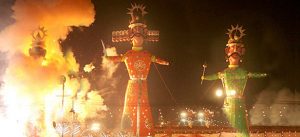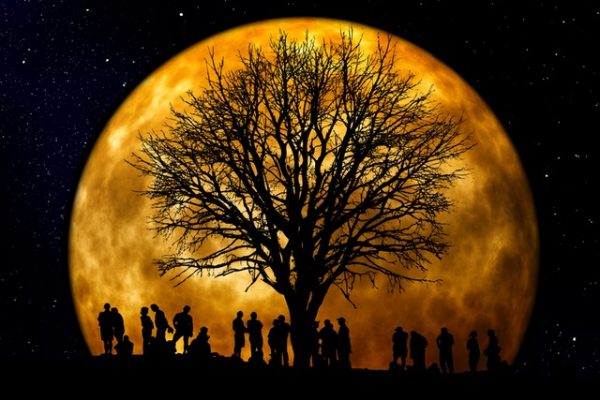 Dussehra is one of the major Hindu festivals of India. It is celebrated throughout the country with great zeal and enthusiasm. People all over the country participate in the occasion in their own way. It is the day when Lord Rama killed the ten headed demon king Ravana and gave the throne of his kingdom Lanka to his brother Vibhishana.
Dussehra is one of the major Hindu festivals of India. It is celebrated throughout the country with great zeal and enthusiasm. People all over the country participate in the occasion in their own way. It is the day when Lord Rama killed the ten headed demon king Ravana and gave the throne of his kingdom Lanka to his brother Vibhishana.Daksha , the Lord of the Earth, and his wife Menaka , had a daughter called Sati. As a child, Sati started worshipping Lord Shiva as her would-be-husband. Lord Shiva was pleased with the Sati’s worship of him and married her. Daksha was against their marriage but could not prevent it. Daksha arranged a yagna to which everyone except Lord Shiva was invited. Sati, feeling ashamed of her father’s behaviour and shocked by the attitude meted towards her husband, killed herself. Lord Shiva was anguished when he discovered this. He lifted Sati’s body on his shoulders and started dancing madly. As the supreme power was dancing with wrath,Narayana the world was on the verge of destruction.
Then Lord came forward as a saviour and used his Chakra to cut Sati’s body into pieces. Those pieces fell from the shoulders of the dancing Shiva and scattered throughout the world. Shiva was pacified when the last piece fell from his shoulder. Lord Narayana revived Sati. The places where the pieces of Sati fell are known as the “Shakti Piths” or energy pits. Kalighat in Kolkata, Kamakshya near Guwahati and Vaishnav Devi in Jammu are three of these places.
In her next birth, Sati was born as Parvati or Shaila-Putri (First form of Durga), the daughter of Himalaya. Lord Narayana asked Shiva to forgive Daksha. Ever since, peace was restored and Durga with her children Saraswati, Lakshmi, Kartikeya, Ganesh and her two sakhis – Jaya and Vijaya visit her parents each year during the season of Sharatkal or autumn, when Durga-Puja is celebrated.
 In Tarot the Judgement card has similar connotations. Aside from resurrection and revival, words with the re- prefix (means again, or to go back, return) helps to remember the concept too, such as: reawaken, rekindle, regenerate, renew, restore, redo… lots ofre-‘s!When the Judgement card appears in a reading, it’s about finding absolution. Through a period of self-evaluation, you will feel cleansed of your ‘sins’, wrongdoings and mistakes, and you will finally be released of your guilt and sorrow about the past. This represents a wonderful purging process and will leave you feeling refreshed and ready to take on any new challenges. The Judgement card suggests that you have had a recent epiphany or an ‘awakening’ where you have come to a realisation that you need to live your life in a different way and you need to be true to yourself and your needs. You have opened yourself up to a new possibility – to lead a fulfilling life that serves your higher needs and that offers inspiration and hope to others. You feel as though you have had a ‘calling’ in life, and you are getting much closer to the point where you need to take action. Something that was lying dormant within you, some unconscious knowledge or truth is finally being awakened and brought into the light.The Judgement card brings a past situation back into being and breathes new life into it, so something is revived and resurrected. The image in the card is often likened to Judgement Day but the theme is not one of being judged, it’s more in keeping with an awakening of the soul released from the past and born anew. There can also be a sense of karma, in reaping what you have previously sown.
In Tarot the Judgement card has similar connotations. Aside from resurrection and revival, words with the re- prefix (means again, or to go back, return) helps to remember the concept too, such as: reawaken, rekindle, regenerate, renew, restore, redo… lots ofre-‘s!When the Judgement card appears in a reading, it’s about finding absolution. Through a period of self-evaluation, you will feel cleansed of your ‘sins’, wrongdoings and mistakes, and you will finally be released of your guilt and sorrow about the past. This represents a wonderful purging process and will leave you feeling refreshed and ready to take on any new challenges. The Judgement card suggests that you have had a recent epiphany or an ‘awakening’ where you have come to a realisation that you need to live your life in a different way and you need to be true to yourself and your needs. You have opened yourself up to a new possibility – to lead a fulfilling life that serves your higher needs and that offers inspiration and hope to others. You feel as though you have had a ‘calling’ in life, and you are getting much closer to the point where you need to take action. Something that was lying dormant within you, some unconscious knowledge or truth is finally being awakened and brought into the light.The Judgement card brings a past situation back into being and breathes new life into it, so something is revived and resurrected. The image in the card is often likened to Judgement Day but the theme is not one of being judged, it’s more in keeping with an awakening of the soul released from the past and born anew. There can also be a sense of karma, in reaping what you have previously sown.
When Judgement appears there’s always a past connection to the matter in question in some way, as revival would suggest. In career matters it could indicate somewhere you’ve previously worked or a past association that will be relevant in some way, connected to house moves it could suggest an old stomping ground you previously called home. As always, surrounding cards would provide the context but with Judgement it is something resurrected and coming back round, (death and rebirth) re-doing, rather than something completely new.
In Astrology we have the planet Pluto which resonates the new beginning. Pluto, God of the Underworld, is the ruler of Scorpio. (In Greek mythology, the corresponding god was Hades). In Astrology, the energies of Pluto are transforming. Pluto represents subconscious forces, ruling all that is “below the surface”. On the up side, Pluto is associated with renewal and rebirth. It represents endings and new beginnings, as well as spiritual growth and rebirth. Negative expression of Pluto is an obsessive desire for power and control and general destructiveness.
Pluto operates on a deeper soul level. We might think we are victims of a divorce, job or home loss, but in fact, some part of our psyche chose liberation from those things we thought we had to have in our lives. Pluto isn’t like a hurricane coming through leaving water damage in its wake, but like a bomb that explodes turning everything to smithereens and ash. But then from that ash, a phoenix emerges and turns into a soaring eagle with a wider view of life on the planet. So in a way, Pluto transits force us to detach and none of us enjoy that process. However, for people practicing Buddhism these Pluto transits will make more sense than to say someone whose life is about status, and consumerism while attaching to things, places and people.
This Pujo, Dusshera and Diwali – change, transform yourself.






No Comments